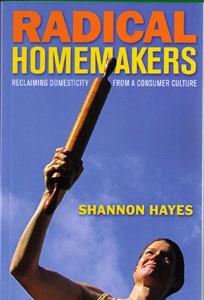 This book completely took me by surprise and I think it may just be a volume that changes the course of my life. If I had found Radical Homemakers by Shannon Hayes on my own, with its strange title and plain cover, I would have moved on. As luck would have it, however, it was the next read on the same pseudo book club that turned me onto ‘The Dirty Life‘, which I reviewed recently. While the last book was interesting, this one spoke to me in a way that I will try my best to explain.
This book completely took me by surprise and I think it may just be a volume that changes the course of my life. If I had found Radical Homemakers by Shannon Hayes on my own, with its strange title and plain cover, I would have moved on. As luck would have it, however, it was the next read on the same pseudo book club that turned me onto ‘The Dirty Life‘, which I reviewed recently. While the last book was interesting, this one spoke to me in a way that I will try my best to explain.
First, I think it important to explain that ‘Radical Homemakers’ refers to men and women around the world—focusing on the U.S. in this book, though—who have shifted their priorities from the rat race of consumerism in its current state, to a life- and home-centric conduct where more of what they need is provided by their own direct labor rather than working at a job to afford to buy it indirectly. If that’s confusing, maybe reading on will clarify better.
The first portion of the book outlines the concept of Radical Homemaking, while the remaining shows you the philosophy in practice using quotes from twenty families already in the midst of the lifestyle. There are so many dissimilarities between these households that they perfectly point out that it’s all about starting where you are and doing all you can to be a producing ‘unit’ instead of a consuming one. The concept section functions by being frank about the economic situation as it pertains to excessive consumerism and the corporate desire to make you buy as much as possible. Instead of living a dogged life trying to make more and more money to buy more and more things you either don’t need or could do for yourself if you had the time. Time taken up by working for dollar amounts. Instead, these people are taking back the looked-down-upon roles of homemaking (though, it really is just homesteading by any other name) to live off of less money, higher quality, and closer community instead of being unfulfilled by meaningless (subjective) jobs to pay for sub-par food quality and less connection with their loved-ones. Hayes recognizes that most people will inherently see nothing wrong with such a lifestyle and has no problems with those who choose to continue to function that way. She also points out that there are still many important jobs outside the home, such as health and social justice roles, and does not demean or decry them. She means only to explore the origin of what homemaking means, why so many people are being drawn back to the proverbial hearth, and share the experiences of just a few of these families. More still can be found on the website radicalhomemakers.com.
Next, I should explain that I have been talking about some of the things in this book for some time in bits and pieces. I don’t think this book has come to me at a better time. It echoes the sentiments in my heart, organizes them, gives history to flesh out the path travelled, and provides experiences that inform me better of the longings I couldn’t put a name to previously.
This is how it makes me feel (and makes concise ideas I’ve already grown or been growing). That even if most of the world thinks living under a multi-generation roof, taking care of your family indirectly, making things from scratch, and producing as many of your own needs while spending the least money is backward, then let them think it. Corporations are not out to help you to be happy, they’re out to help you to buy more of their products—especially if you don’t need them. Community is the single most important skill and asset a person can cultivate. The point is not to do everything alone, but to cultivate relationships with others and share the wealth. There is no way to like everyone, but there is a way to get along with them anyway. Knowledge is important, but you don’t usually have to spend huge amounts of money for the information and hands-on experience. If there is a better way, then what are you waiting for?
There are probably more that fell along the wayside, but that fairly accurately gets much of it across. I’ve been rethinking some things more seriously and will shortly be making efforts to achieve a less stressful lifestyle. I don’t care if anyone thinks it’s a bad idea.